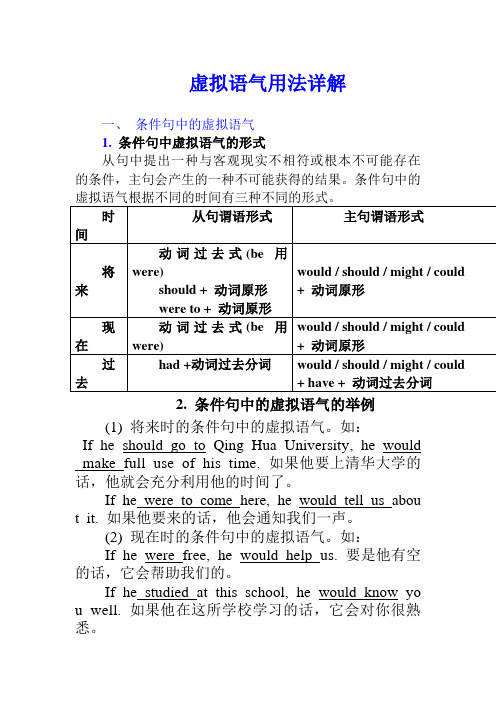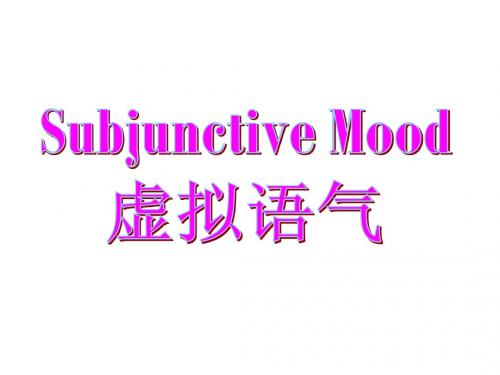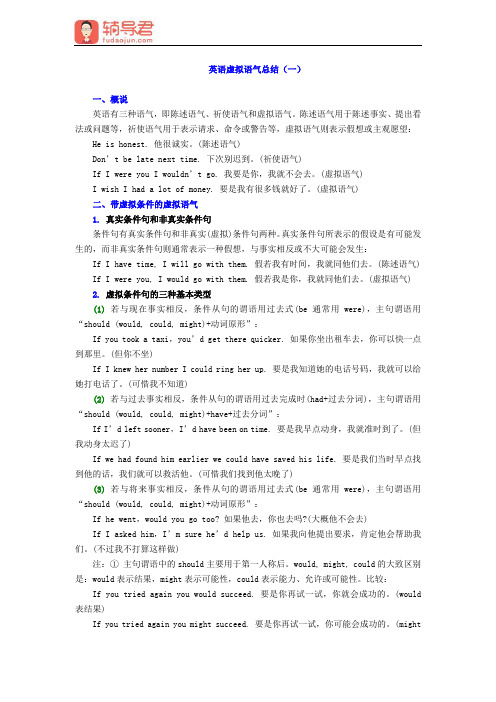虚拟语气1
虚拟语气1

money,I might buy a phone here now,we could tell him this good news you,I wouldn't do that a brother,I could ask him for help
tommorow,we would call off the class to rain tommorow,we’d call off the class tommorow,we would call off the class
虚拟语气1
序 中文
主 谓/系
1 如果你没起那么晚的话,你本来该完成作业的 If you hadn't got
2 如果我昨天早到些,那个孩子是可以被救时不会对他那么生气的 If you had told
4 如果我早知道他是这种人,我不会帮他的
If I had konwn
If it If it If it
rained were should rain
虚拟语气1 宾/表/其他 up so late,you should've finished your homework there earlier,that kid could have been saved me earlier,I wouldn't have been so angry with him that he was this kind of person,I wouldn't have helped him
5 如果我有钱的话,我可能会买个手机
If I
6 如果他现在在这的话,我们就能告诉他这个好 If he
7 如果我是你的话,我不会那样做的
If I
9.18.虚拟语气(1)

I wish I _h_a_d_n_'t__e_at_e_n(eat) so much watermelon yesterday.
as if/as though 虚拟用法同wish
他那样对待我, 好像我是陌生人似的。
He treats me as if I _w_e_r_e a stranger.
• 2. 定义:用来表示说的话不是事实, 或者是不可能发生或可能性比较小的 情况,而是一种愿望,建议,假设的 语气叫虚拟语气。
虚拟语气
Types
1. If 型
与现在事实相反虚拟
If I were a bird, I would have two wings. If I had two wings, I could fly in the sky.
He talks about Rome as if he
_h_a_d_b_e_e_n_(be) there before.
if only 虚拟用法同wish:
Had you come earlier, you would have met him.
If it should rain tomorrow, we would not go climbing.
Should it rain tomorrow, we would not go climbing.
虚拟语气
虚拟语气
高考命题趋势
高考对虚拟语气的考查侧重于:在非真 实条件状语从句中的使用,含蓄条件 句中的用法,名词从句中的用法及一 些特殊句式中的用法。今后高考仍然 会重视对虚拟语气句型的考查,而且 试题语境会更灵活,考查角度更加多 样化。我们要在语境中准确理解运用 。
知识目标
1 会使用if 条件句中虚拟语气句式 2 能使用虚拟语气的几种特殊句式造句
虚拟语气用法详1

虚拟语气用法详解一、条件句中的虚拟语气1.条件句中虚拟语气的形式从句中提出一种与客观现实不相符或根本不可能存在的条件,主句会产生的一种不可能获得的结果。
条件句中的2. 条件句中的虚拟语气的举例(1) 将来时的条件句中的虚拟语气。
如:If he should go to Qing Hua University, he would make full use of his time. 如果他要上清华大学的话,他就会充分利用他的时间了。
If he were to come here, he would tell us abou t it. 如果他要来的话,他会通知我们一声。
(2) 现在时的条件句中的虚拟语气。
如:If he were free, he would help us. 要是他有空的话,它会帮助我们的。
If he studied at this school, he would know yo u well. 如果他在这所学校学习的话,它会对你很熟悉。
(3) 过去时的条件句中的虚拟语气。
如:If I had seen the film, I would have told you about it. 我如果看过这场电影,我会把电影内容告诉你了。
If I had got there earlier, I would have met Mr. Li. 如果我早点到那儿,我就会会到了李先生。
3.运用条件句中的虚拟语气时,须注意的几个问题(1)当从句的主语为第三人称单数时,谓语动词若是系动词be时,可用was代替were。
但在倒装虚拟结构及if I were you, as it were中,只能用were。
如:Were I ten years younger, I would study abroa d. 要是我还年轻十岁的话,我会去国外学习。
If I were you, I would try my best to grasp the chance. 要是我是你的话,我要尽力抓住这次机会。
虚拟语气-1..

3、可能违背将来事实的假设 这里指的是将来不大可能发生的假设,或者虽有可能发生, 说话人主观上不希望发生的假设。这种假设相当于汉语中 常用的“万一”,“居然”,“竟然”等含义。例如: If he should fail, we would encourage him to try again. 万一他失败,我们就鼓励他再试一次。 If I were to do it, I would do it in a different way. 要是我来做这件事,我会是另外一种做法。 We would wipe them out if they should attract us. 如果他们胆敢进攻,我们就将他们消灭。 If it should rain tomorrow, what could we do? 万一明天下雨,我们能做些什么呢? If the rocket should fail in a few seconds, it would certainly explode.如果火箭几秒钟内竟然向下坠落,那就一定会爆炸。
5、连接词 if 的省略 如果条件从句的谓语包含有had, should 或 were,有时 if 可以 省略。这时had,should 或 were 要移到主语前面,形成倒装。 (这种句型主要见于书面形式。) Had he not been ill, he might have come. 要不是生病,他是会来的。 Were I to do it, I would do it in a different way. 要是我来做这件事,我会是另外一种做法。 Should it rain tomorrow, what could we do. 万一明天下雨,我们能做些什么呢? Were it not for his help, we couldn’t have got over the difficulties. 如果不是因为他的帮助,我们就克服不了这些困难。
1.虚拟语气

(should) come • My demand is that she _______________ (come) to see me once a week. 表语从句
• All of us are for the advice that the chemical works (should) be (be)closed down. 同位语从句
2.如果他明天来的话,我会告诉他.
If he were to come here tomorrow, I would tell him.
If虚拟句的倒装
万一下雨,我们将不得不推迟比 赛。
In case of rain, In case it rains, If it should rain, Should it rain,
A. If you should arrive B. If you arrive C. Had you arrived D. Should you arrive
名词性从句中的虚拟 语气及几种虚拟语气 特殊句型
1.表示要求,命令,建议的虚拟语气
一个坚持,两个命令, 三个建议,四个要求 1.insist 2. order, command 3. advise, suggest, propose (advice, suggestion, proposal ) 4. demand , require, request, desire 这些词引导的名词性从句要使用虚拟语气。 即从句中的动词使用should + 动词原形, 或者将should省略。
1. ____the exam, he would have attend a college.
A. If he passed C. Were he passed B. Had he passed D. If he should pass
英语虚拟语气总结(一)

英语虚拟语气总结(一)一、概说英语有三种语气,即陈述语气、祈使语气和虚拟语气。
陈述语气用于陈述事实、提出看法或问题等,祈使语气用于表示请求、命令或警告等,虚拟语气则表示假想或主观愿望:He is honest. 他很诚实。
(陈述语气)Don’t be late next time. 下次别迟到。
(祈使语气)If I were you I wouldn’t go. 我要是你,我就不会去。
(虚拟语气)I wish I had a lot of money. 要是我有很多钱就好了。
(虚拟语气)二、带虚拟条件的虚拟语气1.真实条件句和非真实条件句条件句有真实条件句和非真实(虚拟)条件句两种。
真实条件句所表示的假设是有可能发生的,而非真实条件句则通常表示一种假想,与事实相反或不大可能会发生:If I have time, I will go with them. 假若我有时间,我就同他们去。
(陈述语气) If I were you, I would go with them. 假若我是你,我就同他们去。
(虚拟语气)2.虚拟条件句的三种基本类型(1)若与现在事实相反,条件从句的谓语用过去式(be通常用were),主句谓语用“should (would, could, might)+动词原形”:If you took a taxi,you’d get there quicker. 如果你坐出租车去,你可以快一点到那里。
(但你不坐)If I knew her number I could ring her up. 要是我知道她的电话号码,我就可以给她打电话了。
(可惜我不知道)(2)若与过去事实相反,条件从句的谓语用过去完成时(had+过去分词),主句谓语用“should (would, could, might)+have+过去分词”:If I’d left sooner,I’d have been on time. 要是我早点动身,我就准时到了。
高三英语虚拟语气1

现吨市安达阳光实验学校高三英语虚拟语气【本讲信息】一. 教学内容:虚拟语气虚拟语气是英语中一种重要的语气形式,也是英语语法中一个重要的语法点。
由于虚拟语气所涉及的内容比较广,一些语法书对其的阐述也很繁杂,所以同学们在学习过程中很难掌握其用法,在使用过程中或考试时也很容易出错。
为了便于理解和记忆,我对虚拟语气作了一个“”归纳,供参考。
虚拟语气的使用主要体现在三个方面:虚拟条件句、虚拟语气在某些从的运用,以及虚拟语气的一些特殊用法。
[教学过程]一、虚拟条件句虚拟条件句就是对现实条件的一种虚拟假设,所假设的条件一般不符合事实或与事实相反或在现发生的可能性极小。
根据时间的不同,虚拟条件句可分为三种,即与现在事实相反的虚拟条件句、与过去事实相反的虚拟条件句及与将来事实相反的虚拟条件句。
具体情况请看下表:(1)表示与现在事实相反If I had enough money now, I would lend it to you.If I were you, I would go to tell him the real feeling upon him.(2)表示与过去事实相反If he had taken your advice, he wouldn’t have made such a bad mistake.She would have come to enjoy the party if she hadn’t been very busy.(3)表示与将来事实相反I would go shopping with you if it were to be Sunday tomorrow.If he were to be given another chance to do it again, he could certainly achieve more.1. 虚拟条件句的倒装在虚拟条件,为了强调所假设条件的虚拟性,或突出说话人的一种主观愿望,虚拟条件句可用倒装结构。
虚拟语气1

四、用在as if/ as though引导的方式状语从句中 用在 引导的方式状语从句中 She loves the orphan as if he were her own son. He talked as if he had known everything. 五、It is (high/ about) time that…(用过去时) that…(用过去时 用过去时) It is high time we began to work. It is high time that we should begin to work. It is time that children went to school. It is time that children should go to school.
*可以把 省略,将were, had, should 可以把if省略 可以把 省略, 提前, 提前,构成倒装 Should it rain tomorrow, we would stay at home. Were it to rain tomorrow, we…. Had I not taken your advice, I would have made a bad mistake.
二、在非真实条件句中(所提出的假设 在非真实条件句中( 实现的可能性极小或与事实相反) 实现的可能性极小或与事实相反) (1)与现在事实相反 (1)与现在事实相反 I would go if I had time. If there were no air, people would die. (2) 与过去事实相反 If you had got there earlier, you would have caught the bus. If I had not taken your advice, I would have made a bad mistake.
- 1、下载文档前请自行甄别文档内容的完整性,平台不提供额外的编辑、内容补充、找答案等附加服务。
- 2、"仅部分预览"的文档,不可在线预览部分如存在完整性等问题,可反馈申请退款(可完整预览的文档不适用该条件!)。
- 3、如文档侵犯您的权益,请联系客服反馈,我们会尽快为您处理(人工客服工作时间:9:00-18:30)。
虚拟语气虚拟语气是英语动词的一种特殊形式,表示说话人所说的话并不是事实,而是一种愿望、假设、可能或猜测。
一虚拟语气在非真实条件句中的运用非真实条件句表示不大可能或不可能发生或实现的假设,句中的条件从句与结果从句e.g. If we (leave) now, we should arrive in time.(与现在事实相反)假如我们现在就走的话,我们就能及时到达。
If he had been here, he might have been able to help us.(与过去事实相反)如果他在这里,他也许能帮助我们。
If I were to do the work, I should do it in a different way.(与将来事实相反)要是我做这项工作,我会以不同的方式去做。
If you did t hat again, we wouldn’t allow you to work with us. (与将来事实相反)如果你再那么干,我们就不让你和我们一起工作了。
* 1)在表示将来的虚拟条件句中,一般不用would/could/might, 而用should.2)在句中用不同的情态动词意义略有不同,如:should(应该),would(将,愿意,总是),could(能够,可能),might(可能性较小)。
二省略if 的虚拟条件句在书面语中,当if条件从句含有助动词were, had或should时,可省去连词if,而把were, had或should置于主语前,从而构成倒装虚拟句。
e.g. Were you in my position, you would do the same.假如你处在我的位置,你也会这样做的。
Had he come earlier, he would have met her.要是他早点来的话,他就会见到她了。
三错综时间虚拟句在表示虚拟语气的句子中,条件从句表示的动作与主句表示的动作发生的时间不一致,这时谓语动词的形式要根据各自表示的时间来调整,选用适当的虚拟语气形式。
e.g. If you had taken your medicine yesterday, you would be quite all right now.(从句表示与过去事实相反的假设,主句则表示与现在事实相反)如果你昨天吃了药的话,现在就已痊愈了。
If I were you, I wouldn’t have missed the film last night.(从句表示与现在事实相反的假设,主句则表示与过去事实相反)如果我是你,我就不会错过昨晚的那部电影。
四错综语气虚拟句这类句子一般分为两个部分,它们在语气上截然相反,一部分虚拟,另一部分则用陈述语气,两部分之间常用but, or, or else, otherwise等连接。
它们基本有两种类型:1. 陈述句+or/or else/ otherwise+虚拟句e.g. We didn’t know his telephone number, otherwise we would have telephoned him.我们不知道他的电话号码,否则我们早给他打电话了。
2. 虚拟句+but+陈述句1)would/could+动原+but+现在时陈述句(表示与现在事实相反)2)would/could have+过去分词+but+过去时陈述句(表示与过去事实相反)e.g. You could have passed the exam, but you spent most of your time playing andreading useless books.你可以通过考试,但你把大部分时间都花在玩和看无关的书籍上。
五含蓄虚拟句有时假设的条件不通过条件从句表达出来,而暗含在某些介词短语里,如but for, without,意思是“要不是,如果没有……”, 常用should/would+现在完成时e.g. But for your help we couldn’t have succeeded in the experiment.如果没有你的帮助,我们的实验是不会成功的。
*but for除上述用法外,还可同except for,表示“除……之外”,此时用陈述语气。
e.g. But for a half hour or so for lunch I am here all day.除了吃午饭半小时左右,我整天都在这里。
六名词性从句中虚拟语气1主语从句中的虚拟语气1.某些表示愿望、请求、建议、假设等意义的名词所引导的主语从句中It is/was a pity (shame, wonder, suggestion, proposal, requirement, request, desire,order, recommendation…) that…用(should+)动原e.g. It is a proposal that we should rest for a while.2.“It is+形容词或过去分词+that…”的主语从句中1) It is/was necessary (important, strange, right, proper, essential, urgent, imperative,advisable, desirable, preferable, appropriate, possible, natural, insistent, better, best,ridiculous, vital, crucial…) that…用(should+)动原e.g. It is important that we should speak politely.我们说话要有礼貌,这是很重要的。
It is essential that these application forms be sent back as early as possible.将这些申请表格尽快地反馈回来是很必要的。
2) It is/was desired (arranged, decided, ordered, proposed, requested, required,recommended, suggested, settled…) that…用(should+)动原e.g. It has been decided that the exam be put off until tomorrow.已决定考试推迟到明天。
It is desired that this rule be brought to the attention of the staff.希望这条规则引起全体职员的注意。
2宾语从句中的虚拟语气在下列动词ask, arrange, beg, advise, command, deserve, desire, demand, determine, move, prefer, propose, intend, recommend, request, require, suggest, suppose, urge, vote…后的宾语从句中,谓语动词用(should+)动原e.g. Mr. Chairman, I move that the money be used for library books.主席先生,我提议把那笔钱用来购买图书馆书籍。
*当suggest作“表示、暗示”,insist作“坚持说,坚持认为”讲时,则要用陈述语气。
e.g. He suggested we go to tomorrow’s exhibition together. (虚拟语气)他建议我们一起去明天的展览会。
Her impression suggested that she was angry. (陈述语气)她的表情说明她生气了。
Mike’s uncle insists that he not stay in this hotel.(虚拟语气)迈克的叔叔坚持不住这家旅馆。
(坚持要求、一定要)She insisted that she heard somebody in the house.(陈述语气)她坚持说听到有人在家里。
3表语从句及同位语从句中的虚拟语气当advice, decision, desire, demand, idea, order, motion, necessity, insistence, instruction, plan,preference, proposal , pray, recommendation, requirement, resolution, suggestion, understanding等名词后接表语从句或同位语从句时,从句谓语用(should +)动原e.g. The professor gave the order that the test be finished before 10.教授指示考试须在十点以前结束。
Our idea is that the match be put off.我们的意思是比赛延期举行。
七其他虚拟句型1.wish后的宾语从句1)对将来情况的憧憬和愿望,宾语从句的谓语动词用would/ could/ might+动原e.g. I wish he would try again.我希望他再试一次。
I wish I could be of some use.我希望自己能发挥点作用。
2)对现在或当时情况的一种愿望时,宾语从句的谓语动词用一般过去时或过去完成时e.g. Sometimes I wish I were living in a different time and a different place.有时我真希望自己生活在另一个时代和另一个地方。
I wish I knew how to program the new computer.我希望我懂得如何给这台新计算机编程序。
3)对过去发生的事情表示遗憾或后悔时,宾语从句的谓语动词用过去完成时或would/could/might+have donee.g. I wish I could have slept longer this morning, but I had to get up and come toclass.我真希望今天早晨能多睡一会,但我不得不起床去上学。
Jack wishes that he had studied business instead of history when he was inuniversity.杰克希望他上大学时学的是商业而不是历史。
